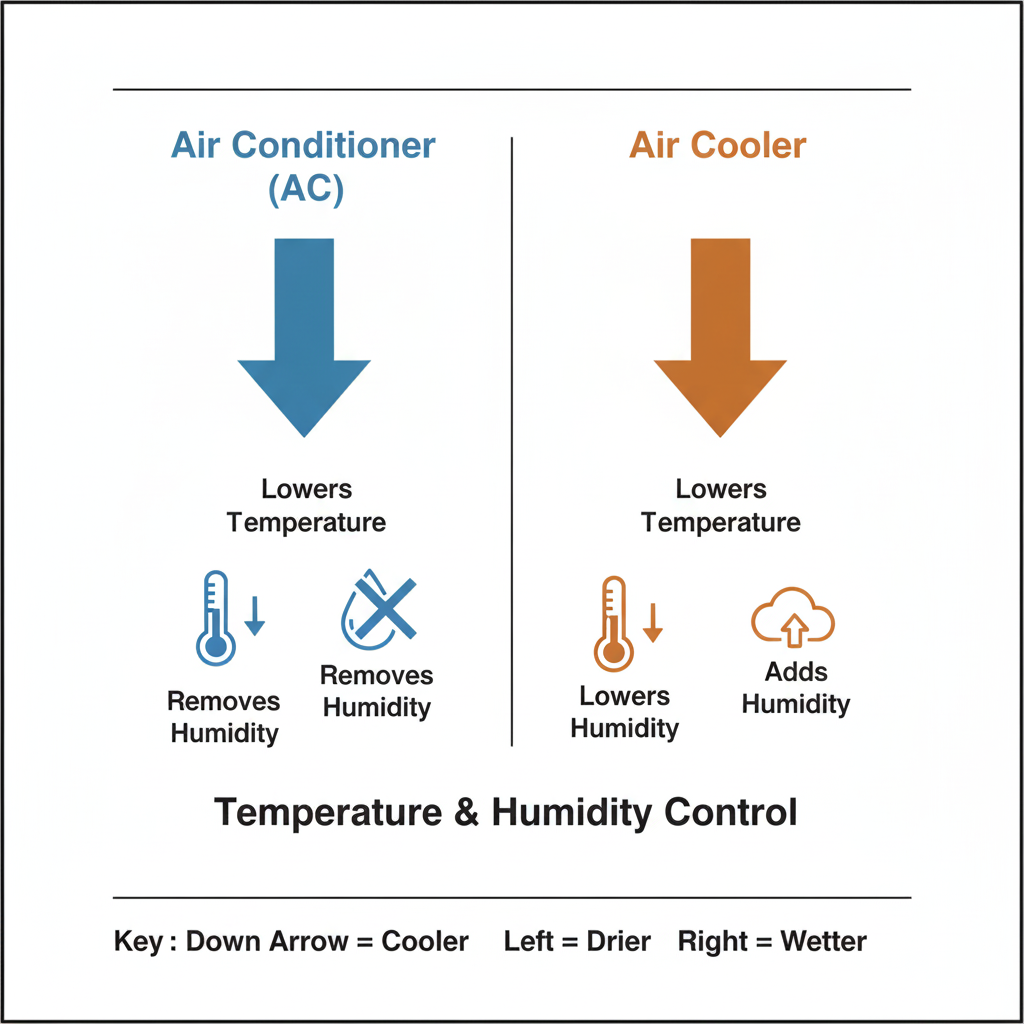When the summer heat rises, many households ask the same question: Should I run the air conditioner for 15 minutes or the air cooler for 2 hours?
The answer depends on cooling principle, energy use, comfort, and climate suitability. Let’s break it down.
Which is Better: AC or Cooler?
- Air Conditioner (AC): Works on the refrigeration cycle, removing both heat and humidity. Cools any climate.
- Air Cooler: Works on evaporative cooling, adding moisture. Effective only in dry climates.
👉 Verdict: AC delivers consistent comfort across all regions, while coolers are limited to hot & dry areas.
Does AC Consume More Electricity Than a Cooler?
- AC (1.5 ton, ~1.5 kW): Uses ~1.5 units per hour → ~0.4 units in 15 min.
- Cooler (~200W): Uses ~0.2 units per hour → ~0.4 units in 2 hrs.
⚡ Key Insight: While coolers appear cheaper, the total energy consumption can be similar. The difference is in comfort per unit consumed — AC cools better and faster.
Note: Actual consumption varies with AC star rating, inverter technology, set temperature, insulation, and cooler motor size.
Why Doesn’t a Cooler Work in Humid Weather?
- Coolers add moisture → in humid conditions, air feels sticky and damp.
- AC removes moisture → ensures balanced humidity and comfort.
🌡️ According to ASHRAE comfort standards, thermal comfort depends on temperature + humidity control. Only AC manages both.
AC vs Cooler – Technical Comparison
| Parameter | Air Conditioner (AC – 15 min) | Air Cooler (2 hours) | HVAC Concept Involved |
|---|---|---|---|
| Cooling Principle | Refrigeration cycle – removes sensible + latent heat. | Evaporative cooling – reduces dry bulb temp only. | Refrigeration vs. Evaporation |
| Temperature Drop | Reduces room temp by 8–12 °C in 15 min. | Reduces temp by 3–5 °C (less in humid weather). | Sensible Cooling |
| Humidity Control | Dehumidifies air → comfort in humid regions. | Adds humidity → uncomfortable in coastal areas. | Latent Heat Load |
| Air Quality | Filters pollutants (basic to HEPA). | Brings in outdoor dust, pollen, insects. | Indoor Air Quality (IAQ) |
| Comfort Duration | Cooling lasts ~30–40 min even after shutdown. | Effect ends immediately after power off. | Thermal Inertia |
| Energy Consumption | ~0.4 units in 15 min. | ~0.4 units in 2 hrs. | Energy Efficiency (kWh) |
| Climate Suitability | Works in all climates. | Works only in dry climates. | Psychrometric Zones |
| Health & Comfort | Prevents mold, filters air, balances humidity. | High humidity → risk of dampness, allergies. | ASHRAE Comfort Standards |

Which One Should You Choose?
✅ Dry inland regions (e.g., Rajasthan, Gujarat): Cooler can be economical.
✅ Humid/coastal/urban regions: AC is far more effective.
✅ Health-conscious users: AC ensures air quality + humidity balance.
Final Takeaway
If your priority is long-lasting comfort and healthy indoor air, 15 minutes of AC is often better than 2 hours of cooler use.
Coolers still have their place in hot, dry climates, but AC offers all-weather reliability and better comfort per unit of energy consumed.


Finally Someone putred it in correct manner.
👍
Thank You Santosh Ji
Technically Well explained.
Thank You Sir for your valuable feedback.
I have been trying to understand why coolers are not effective in plains from many years.
This explanation is exactly the closure of mine thoughts.
Thank you, sir. I’m glad my explanation brought the closure you were looking for after all these years! If you have any more questions, feel free to ask.